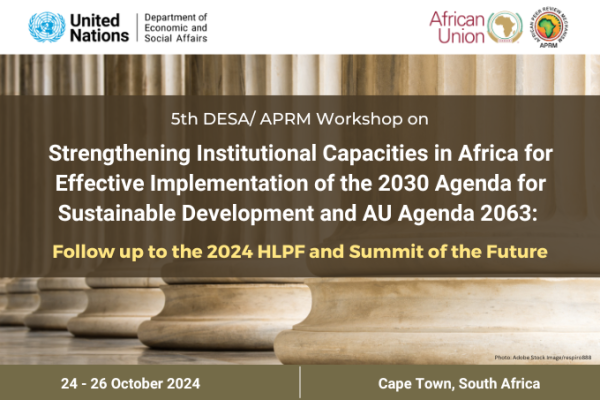
The African Peer Review Mechanism (APRM) and the United Nations Department of Economic and Social Affairs (UN DESA) regional workshop on Strengthening institutional capacities in Africa for effective implementation of the 2030 Agenda for Sustainable Development and AU Agenda 2063: Follow-up to the 2024 HLPF and Summit of the Future is the fifth in a series designed to support countries in their efforts to build effective, accountable and inclusive institutions at all levels.
These capacity building and peer learning workshops have become a valuable continental gathering place to share experiences and consider joint actions in support of implementation of the two Agendas. They seek to improve the means of implementation of the 2030 Agenda and Agenda 2063, enhance monitoring and evaluation capacities, and promote alignment and integration of follow-up to the two Agendas into national development plans and strategies at the country level as called for by the AU-UN Framework for the Implementation of Agenda 2063 and the 2030 Agenda for Sustainable Development. They are also an opportunity for African countries to share knowledge and enhance national capacities that are required to implement recommendations emanating from key global and regional meetings such as the high-level political forum, the SDG Summit, the Summit of the Future, AU Summits, and the Africa Regional Forum on Sustainable Development.
UN DESA and AU/APRM have been partnering to support African countries in strengthening governance capabilities since 2019, using the UN principles of effective governance for sustainable development as a foundation for action. The UN governance principles were developed by the United Nations Committee of Experts on Public Administration and endorsed by the Economic and Social Council in 2018. This model of collaboration has led to several innovations at regional and national levels and has led to many initiatives on the principles of effective governance in Africa, including the production of a baseline study on the implementation of the principles of effective governance in Africa by APRM, a composite of practical toolkits for the implementation of the principles in support of the SDGs and Agenda 2063, and several follow-up activities at national level.
This workshop aims at supporting African countries in exploring development of concrete, tangible outcomes and plans of action for building effective, accountable and inclusive institutions that contribute to implementation of the 2024 Ministerial Declaration of the HLPF, the Pact of the Future and the second 10-year implementation plan of AU Agenda 2063 with a view to accelerating the achievement of national aspirations and objectives while responding to the related national development priorities identified by countries. The topics will focus on institution building strategies that support efforts to safeguard the future; manage national, regional and global shocks; build local knowledge and capacities by leveraging the principle of subsidiarity; promote science, technology and innovation while addressing digital divides; and transform the global financial system.
Specifically, workshop participants will examine:
• Institutional coherence and implementation of Agenda 2063 and 2030 at the national level
• How to leverage the CEPA principles in strengthening national and local capacities to pursue the two Agendas at the subnational level
• Implementation efforts towards SDG 16 and Moonshot 3 of Agenda 2063 and the six transitions to accelerate progress towards the SDGs
• Monitoring and evaluation frameworks and interlinkages with the CEPA principles • Using the Pact of the Future and other instruments to build resilience to global shocks.
Contact Information:
Saras Jagwanth (jagwanth@un.org)
Sara Tawfik Hamouda (sara.hamouda@aprm-au.org)
 欢迎来到联合国,您的世界!
欢迎来到联合国,您的世界!